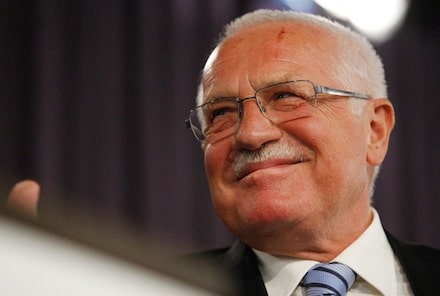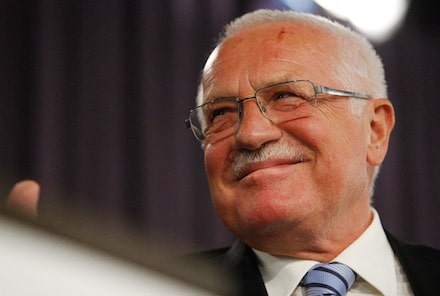
Please see below excerpts from a Global Gold interview with former Czech President and Prime Minister Vaclav Klaus. To read the entire interview, please click here. -ed.
Liberty is a fundamental human right; it is the cornerstone of our existence. But liberty is under attack from all directions, whether through higher state control or individuals themselves. Liberty is in search for its protector.
We were given the opportunity to talk to a vanguard of liberty, former President of the Czech Republic, Prof. Ing. Václav Klaus. Mr. Klaus shares with us how he embraced the values of classic liberalism and free markets while growing up under communism and the challenges he faced. Of course, we were eager to hear his account on the peaceful split of Czechoslovakia which took place during his years as Prime Minister and also about the transition of the currency system, which was successfully initiated at the same time. We were keen to find out his stance on the situation in Greece and if a potential exit of countries like Greece from the Euro zone would be really such a disaster. We are happy to share with you the thoughts and perspectives of a man who says about himself that “he never intended to be a politician or office-seeker”. His motivation was to establish the rules of a market economy after the fall of communism but he never wanted to plan its outcome. Mr. Klaus has valued and protected the ideas of liberty and freedom for many years to this day.
Global Gold: I would like to dive into some aspects of the recent history of the Czech Republic, from which I think there is a lot to learn. Czechoslovakia was dissolved in 1993. Do you think it can be seen as an example of how states can be dissolved in a peaceful manner and new smaller units of government can be created? Can you give us your insight into why the dissolution happened and why it was so peaceful?
Mr. Klaus: I was born in Czechoslovakia and I took the country – with its defined borders – for granted. It never came to my mind that the country would be dissolved. Communism, of course, prohibited all serious discussions, including the issues of nations, nationality, federation, nation-states and so on. Such a debate did not exist. After the fall of communism everything was suddenly possible. We, the Czechs, discovered that Slovakia did not just want the end of communism, which was our aim; they also wanted their own sovereign nation-state. We were surprised by it and I must say it took us two years to understand how it went and how it can move forward. I had one special position. I spent all my holidays in Slovakia because my wife is a Slovak. I knew Slovakia better than most of the Czechs and I understood that Slovakia wanted to be alone.
After the parliamentary election in 1992, we started to negotiate with the Slovaks either to stay in a common state or to separate. They accepted the second solution. And my task as prime minister at the time was to make the separation as friendly, as smoothly and rapidly as possible. In more or less six months, we were able to sign 25 intergovernmental treaties between the Czech Republic and Slovakia and we divided everything peacefully and friendly. On the 1st of January 1993 the country was divided. …
Global Gold: We believe there is a massive power shift underway from the West to the East, whether economically, militarily, etc.. Do you see this power shift as well? We get the feeling that most of the West is unaware or blind towards the fact that this paradigm shift is underway; they are still concentrated on the West. What is your opinion on that?
Mr. Klaus: Definitely. I think that many people, especially in Europe still live in a nirvana of self-satisfaction and do not consider that the European economy has been stagnating for a very long time, whereas the rest of the world has been moving upward. We tragically underestimate this fact. I am absolutely shocked that the European politicians, business people, and intellectuals don’t take this issue seriously.
Global Gold: This brings us to the “Charlie Hebdo” attack in France that I wanted to ask you about. What do you believe is the root cause of what happened? Do you think that this tragedy will be misused by the political elites to further circumvent the individual liberty in Europe using more control and every possible excuse for security reasons to watch every step of the citizens?
Mr. Klaus: We experienced it in 2001 in America and it had very negative repercussions for us in Europe. I am afraid there will be a new wave of attempts to limit our personal freedom due to the so-called fighting of terrorism. I think it is wrong to concentrate on the tragic event in Paris. At the same day of the Paris attacks an estimated 2000 people were killed by terrorists in Nigeria. But in Paris, of course, it was closer to us. We should look for the reasons behind what happened here and there. I am afraid that the main reason is twofold. One of them is the erroneous idea of multiculturalism which is destroying our societies and the other is a parallel-going concept, the doctrine of universalism. The fall of communism allowed for a sort of ideological vacuum, which was very rapidly filled by the export of democracy and of our concept of human rights from the West to the rest of the world. And this is a totally wrong idea. It created many unsuccessful wars and destabilized countries in the Middle East, Africa, Asia, and elsewhere. The export of Western-style democracy and of new universalism created a reaction. This reaction came with another form of universalism, with Islamism. Those are twin brothers, I would say. Multiculturalism and the doctrine of universalism are for me in the roots of terrorism.
Global Gold: How can we as individuals regain liberty? If there is one key message you would like to convey to our readers what would it be?
Mr. Klaus: We have to fight for liberty permanently, every day, all over the world, in every country. I think it is necessary to have different ways, like your company’s publications, to communicate our views, in this respect. Free press and free speech are fundamental issues. I know that they are restricted in many places in the current world we live in. I am glad that I could have such a fair debate here with you because I know that in some publications in Europe, to criticize the European Union is almost impossible. I see how I’m losing contact with some newspapers, journals and journalists because of my sharp criticism of the situation in the European Union plus now, the situation in Ukraine.
Global Gold: That is absurd. We heard that because of your stance on Ukraine that CATO, supposedly a free market think tank has severed its relationship with you after you were named a Distinguished Senior Fellow there two years ago?
Mr. Klaus: I think that “supposedly” is a good term. In the past I would say it was a free market think tank. I am not sure now. I’m very angry with the misinterpretation of the situation in Ukraine and with the fact that this is done in a way I did not expect to live through again. This is like a communist propaganda which I experienced fifty years of my life. That is why I’m very sensitive, maybe over-sensitive to this issue.
Reprinted with permission from Global Gold.

